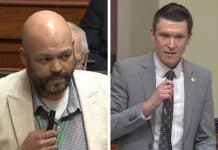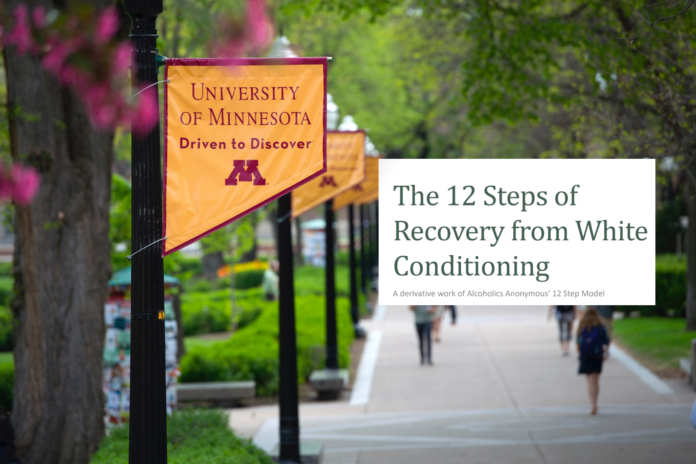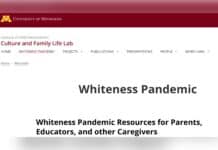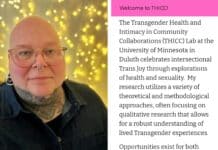The University of Minnesota hosted an online lecture over the summer that taught viewers how to use the 12 steps of Alcoholics Anonymous to recover from their whiteness.
“The Model of Recovery from White Conditioning, a derivative work based on the 12 steps of Alcoholics Anonymous, is rooted in love and accountability,” states an online description of the webinar. “It involves white people, working in our community to transform violent legacies of whiteness into healthier, white, anti-racist community … and it requires us to have the courage to start with ourselves.”
The College Fix first reported the story last week, noting that viewers could earn “continuing education credits” for watching the webinar and completing a “post test.”
The lecture was hosted by Cristina Combs, a therapist and graduate of the University of Minnesota.
“In 2015, after years of struggling to navigate the role and presence of whiteness in her personal, academic, and professional journeys, Cristina developed the Model of Recovery from White Conditioning,” her bio states. “She is grateful for all the thought leaders, healers, mentors, and humans who have shared their authentic selves with her, nurturing and challenging a pursuit of lifelong learning, innovation, and growth.”
The webinar, which took place in July, was the first in a three-part series on “Deconstructing & Decentralizing White-ness in Practice,” a project of the university’s School of Social Work and Center for Practice Transformation.
“When BIPOC activists would use the term ‘white supremacy’ to talk about the systems that needed to change and the work that white people needed to do, my instinct was to recoil. It felt like too hard or too raw of a word, and I didn’t like it. And I ultimately realized that that is my ego,” Combs said during the lecture, The College Fix reported.
“Stepping into that tension and accepting my connection to white supremacy has been a freedom of sorts to show up in better alignment with my values and do the work for the rest of my life,” she added.
According to a PowerPoint presentation from her lecture, the 12 steps for recovering from “white conditioning” include:
- “We admitted that we had been socially conditioned by the ideology of white supremacy.”
- “We came to believe that we could embrace our ignorance as an invitation to learn.”
- “We developed support systems to keep us engaged in this work.”
- “We journeyed boldly inward, exploring and acknowledging ways in which white supremacist teachings have been integrated into our minds and spirits.”
- “We confessed our mistakes and failings to ourselves and others.”
- “We were entirely ready to deconstruct previous ways of knowing, as they had been developed through the lens of white supremacy.”
- “We humbly explored new ways of understanding … proactively seeking out new learning and reconstructing a more inclusive sense of reality.”
- “We committed ourselves to ongoing study of our racial biases, conscious or unconscious, and our maladaptive patterns of white supremacist thinking.”
- “We developed strategies to counteract our racial biases.”
- “We embraced the responsibility of focusing on our impact, more than our intentions, in interactions with people of color.”
- “We engaged in daily practices of self-reflection.”
- “We committed ourselves to sharing this message with our white brothers, sisters, and siblings … in order to build a supportive recovery community and to encourage personal accountability within our culture.”
Like AA, Combs said a weekly recovery meeting takes place every Wednesday night. Other “recovery from white conditioning” meetings have started up in San Francisco and New Haven, she said.
During the meetings, a facilitator reads “short bios of white anti-racists who have gone before us.”
“We read one aloud each week. They serve as part of our meeting rituals, designed to motivate us to take action and fight for social change in tangible ways,” states a website for the whiteness recovery program, which offers a “first edition text of Recovery from White Conditioning.”
Combs has also developed a “step 4 worksheet” for white people. In AA, the fourth step calls for a “sweeping and fearless moral inventory.”
“We explore ways, past and present, in which the ideology of white supremacy has negatively impacted us: our understanding of history, our social networks, and our patterns of interacting with people of color, with an emphasized focus on microaggressions,” says the worksheet.
The University of Minnesota has hosted similar events in the past, including a 2018 lecture on the “existential threat” of whiteness.










